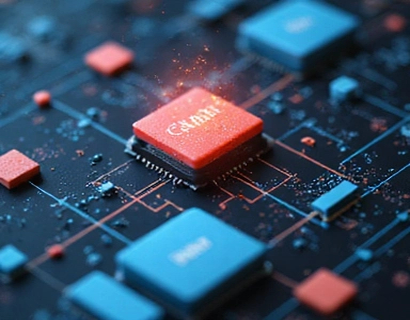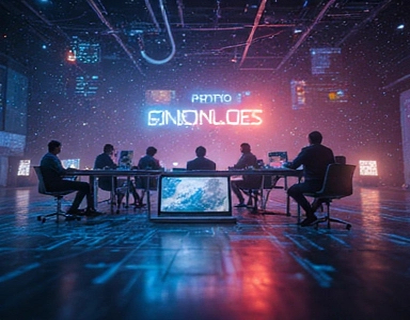Smart Contracts and Management Tools: Revolutionizing Governance for Enhanced Democracy and Participation
In the digital age, the landscape of governance is undergoing a significant transformation, driven by technological advancements that promise to enhance democratic processes. Among these innovations, smart contracts and management tools stand out as pivotal elements that can revolutionize governance, streamline decision-making, enhance transparency, and boost community engagement. This article delves into the transformative potential of smart contracts and innovative management tools in making democratic processes more accessible and efficient, catering to individuals and organizations eager to pioneer new governance solutions.
The Essence of Smart Contracts
Smart contracts are self-executing contracts with the terms of the agreement directly written into code. They operate on blockchain technology, which ensures that the contract is immutable and transparent. This technology eliminates the need for intermediaries, reducing costs and increasing efficiency. In the context of governance, smart contracts can automate various processes, from voting to resource allocation, ensuring that decisions are made swiftly and fairly.
Streamlining Decision-Making
One of the most significant advantages of smart contracts is their ability to streamline decision-making processes. Traditional governance structures often involve lengthy deliberations and bureaucratic hurdles that can delay important decisions. Smart contracts can automate these processes, allowing for quicker responses to community needs. For instance, in a local government setting, a smart contract could facilitate the allocation of funds for community projects based on predefined criteria, ensuring that resources are distributed efficiently and transparently.
Enhancing Transparency
Transparency is a cornerstone of democratic governance. Citizens must trust that their leaders are acting in their best interests and that decisions are made openly. Smart contracts inherently provide a transparent framework, as all transactions and agreements are recorded on a public blockchain. This transparency allows citizens to verify the actions of their representatives and hold them accountable. By making governance processes more visible, smart contracts can help rebuild trust in public institutions.
Boosting Community Engagement
Community engagement is essential for a thriving democracy. When citizens feel empowered to participate in decision-making, they are more likely to invest in their communities. Smart contracts can facilitate this engagement by providing platforms for direct participation. For example, citizens can use smart contracts to propose initiatives, vote on community projects, or even allocate budgets. This level of involvement fosters a sense of ownership and responsibility among community members, leading to more vibrant and active civic participation.
Innovative Management Tools
In addition to smart contracts, innovative management tools play a crucial role in enhancing governance. These tools can range from project management software to platforms that facilitate communication and collaboration among stakeholders. By integrating these tools with smart contracts, organizations can create a comprehensive governance framework that promotes efficiency and inclusivity.
Project Management Software
Project management software can help organizations plan, execute, and monitor projects effectively. When combined with smart contracts, these tools can automate task assignments, track progress, and ensure that deadlines are met. This integration allows for greater accountability and transparency, as all stakeholders can access real-time information about project status and resource allocation.
Collaboration Platforms
Collaboration platforms enable stakeholders to communicate and share information seamlessly. These tools can enhance governance by fostering dialogue among community members, leaders, and organizations. By creating spaces for discussion and feedback, collaboration platforms can ensure that diverse perspectives are considered in decision-making processes. When integrated with smart contracts, these platforms can facilitate the implementation of community-driven initiatives, ensuring that the voices of all stakeholders are heard.
Case Studies: Successful Implementation of Smart Contracts in Governance
To understand the practical implications of smart contracts in governance, it is essential to examine real-world examples where this technology has been successfully implemented. These case studies illustrate the potential of smart contracts to enhance democratic processes and community engagement.
Case Study 1: Voting Systems
Several jurisdictions have experimented with blockchain-based voting systems that utilize smart contracts to ensure secure and transparent elections. For instance, in 2025, a pilot program in Utah allowed overseas voters to cast their ballots using a blockchain application. The smart contract ensured that each vote was recorded accurately and could not be altered, providing a secure and transparent voting process. This initiative not only increased voter participation but also demonstrated the potential for technology to enhance electoral integrity.
Case Study 2: Resource Allocation in Local Governments
In a local government in Switzerland, officials implemented a smart contract system to manage public funds for community projects. Citizens could propose projects, and the smart contract would automatically allocate funds based on predefined criteria, such as community support and feasibility. This approach not only streamlined the funding process but also encouraged greater community involvement in local governance, as residents felt empowered to contribute to decision-making.
Challenges and Considerations
While the potential of smart contracts and management tools in governance is immense, several challenges must be addressed to ensure their successful implementation. These challenges include technological barriers, regulatory concerns, and the need for public education.
Technological Barriers
Implementing smart contracts requires a robust technological infrastructure, including access to blockchain technology and the necessary skills to develop and maintain these systems. In many regions, especially in developing countries, these technological barriers can hinder the adoption of smart contracts in governance. Ensuring equitable access to technology is crucial for fostering inclusive democratic processes.
Regulatory Concerns
The legal status of smart contracts varies across jurisdictions, and regulatory uncertainty can pose challenges for their implementation. Governments must establish clear legal frameworks that recognize the validity of smart contracts and outline the responsibilities of all parties involved. This regulatory clarity is essential for building trust in the technology and encouraging its adoption in governance.
Public Education
For smart contracts and management tools to be effective in enhancing governance, the public must be educated about their benefits and functionalities. Initiatives aimed at raising awareness and providing training on these technologies can empower citizens to engage actively in democratic processes. Public education campaigns can help demystify the technology and encourage broader participation in governance.
The Future of Governance with Smart Contracts
The future of governance is poised for transformation as smart contracts and innovative management tools gain traction. As more organizations and governments explore the potential of these technologies, we can expect to see a shift towards more participatory and transparent governance models. The integration of smart contracts into governance frameworks can lead to enhanced accountability, increased citizen engagement, and more efficient decision-making processes.
Decentralized Governance Models
One of the most exciting prospects of smart contracts is the potential for decentralized governance models. By leveraging blockchain technology, communities can create governance structures that are not reliant on traditional hierarchies. Decentralized autonomous organizations (DAOs) are an example of this model, where decisions are made collectively by stakeholders through smart contracts. This approach empowers individuals to have a direct say in governance, fostering a sense of ownership and responsibility.
Global Collaboration
Smart contracts can also facilitate global collaboration in governance. As communities around the world adopt these technologies, they can share best practices and collaborate on common challenges. This global network of innovative governance solutions can lead to the development of more effective and inclusive democratic processes, transcending geographical boundaries.
Conclusion
Smart contracts and innovative management tools hold the potential to revolutionize governance, making democratic processes more accessible, efficient, and participatory. By streamlining decision-making, enhancing transparency, and boosting community engagement, these technologies can foster a new era of governance that empowers individuals and organizations alike. As we move forward, it is essential to address the challenges associated with their implementation and to promote public education to ensure that all citizens can benefit from these advancements. The future of governance is bright, and with the right tools and frameworks in place, we can work towards a more universal democracy that truly reflects the will of the people.











































